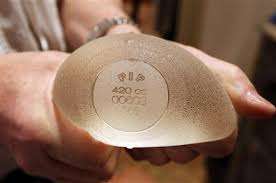According to news this week the final report into the PIP Implants scandal has concluded that the gel material contained in the implants does not cause a long-term threat to human health.
It says the implants, which were made with unauthorised silicone filler, are not toxic, nor carcinogenic.
 For the 47,000 women in the UK who have had the implants fitted however, the report did confirm the PIP implant as defective in so much as they do have double the rupture rate of other implants. Furthermore that although not ‘toxic, nor carcinogenic’, upon patients experiencing symptoms of rupture – for example tenderness, soreness or lumpiness – they should speak to their surgeon or GP.
For the 47,000 women in the UK who have had the implants fitted however, the report did confirm the PIP implant as defective in so much as they do have double the rupture rate of other implants. Furthermore that although not ‘toxic, nor carcinogenic’, upon patients experiencing symptoms of rupture – for example tenderness, soreness or lumpiness – they should speak to their surgeon or GP.
Prof Keogh the NHS medical director said women had faced an “incredibly worrying time” and that repeated tests in many countries have “shown that the implants are not toxic and therefore we do not believe they are a threat to the long-term health of women who have PIP implants”.
As such, it seems the final verdict is that the PIP implants are substandard but not toxic?
As a consumer in any other situation, there are basic consumer rights at play and it will be interesting to see if those Cosmetic Clinics who has previously refused removal and replacement will now change their stance given the confirmation of the implants defective nature in respect of rupture rate.
Is this the end of the matter?
As a non medically trained person I have to form opinions and my own conclusions on medical matters like the PIP case, based not just on one report or statement but a host of available material in the media and from those that release it. I, like many (save for DailyMail readers perhaps) make my decisions and opinions based on factual evidence, the quality of that evidence and the person or organisation releasing it.
I would value the reporting from the BBC over a tabloid as I would value the medical opinion of a GP more than I would of a cabbie for instance.
We are a complex creature and the conscious mind is unfathomably more complex than the body containing it and when medical or scientific reports are released, I have to be honest and say I have started to view them with cynicism.
Conflicting medical studies affecting trust
How often do we hear conflicting studies about the effects of mobile phones on our health?
There is a plethora of studies from leading universities and respected medical research organisations that have cited mobile phones as causing brain tumours and cancers through usage, and even testicular cancer and fertility problems from the heat and radiation of mobile phones, if frequently stored in your trouser pocket.
Yet all of those studies and reports about the ‘possible’ dangers of mobile phones in respect of said cancers and damage to DNA were then refuted with conflicting studies saying it was ‘likely there is no link to cancer’ and so on.
Last year, British scientists at the University of Manchester released data showing that there was no significant change in the number of cancer cases diagnosed since mobile phones were introduced, which they said ‘indicated that mobile phone devices were not likely to increase the risk of brain tumors’. Yet months later, experts for the World Health Organization officially classified mobile phones as “possibly carcinogenic to humans,”
Who or what do you believe?
In some sort of comedic timing in light of the other ‘is it safe or not’ studies this week, and brilliantly emphasizing my point above, also this week the US Federal Communications Commission (FCC) chairman Julius Genachowski interestingly circulated a proposal to his commission calling for a formal review of the agency’s current standards on the health risk from mobile phones, which were last updated in 1996, to establish a safe level of human exposure to radio-frequency energy.
It’s hard to not start seeing such reports and studies as a pantomime spectacle of ‘It’s behind you!’, and ‘Oh no it isn’t!’
Tea now causes cancer?
If on the same day that the PIP update broke in the media, a story was released saying a Glasgow University study had claimed that drinking normal tea (not the green type) is now thought to not reduce, but instead increase the risk of cancer by up to 50%, how are we to think that the PIP Implants report is as conclusive as the claim?
The simple answer is we don’t.
What is often the case is that in the release of medical studies or reports, there is an assumed caveat in that the conclusions are based upon information available at the present time.
Now I don’t want to appear alarmist and I do think medical advice needs to be followed but as with any form of advice, circumstances can change and I would like to see the PIP Implants issue kept under review so that future developments be they of a positive or negative nature, are allowed to develop as the research and available information and the very procedures governing medical reports also develop so that the public is given the latest information as it relates to them.
That the evidence and standpoint on the mobile phone / cancer link hasn’t been reviewed since 1996 is somewhat worrying, given the potential health risks at stake and I would hate for the PIP issue to rear its ugly head again in 10-15 years time with a retraction to the current advice.
However, in the interests of a balanced argument it must be said that on the subject of toxicology in the final PIP report, the following was said, “there is no reason to believe that further testing will change this conclusion, given the results of the chemical analysis”. |The MHRA however have commissioned a further series of toxicity tests on additional samples of PIP silicone gel to assess the potential of the gel to cause cytotoxicity, genotoxicity, or skin irritation. The results of these tests will be published as soon as they are available.
Cosmetic Clinics Reputation
I was recently consulted on the implications of PIP Implants for the industry and other parties and as I have said before, I again cited the example of clinics like Harley Medical who refused to remove and replace the implants and instead shifted the responsibility to the NHS.
When Harley Medical shifted the liability it basically said yes we will take the profit from the PIP implants but now there is something wrong, the NHS should brunt the cost so leave us alone.
This was just like Toyota not holding its hands up (which is did in respect of the brake/accelerator recalls) and saying yes you may have a Toyota car, and thanks for that but if you want to get your brakes looked at, pop into your local Ford garage, as they have more garages than we do so are better equipped to deal with the cost of making it right.
Consumers remember actions like that and when a product is one that when faulty, can impact your health, as supplying businesses (i.e. Cosmetic Clinics), your time in the market place is limited if that’s the level of customer service you are sticking with.
If you want to discuss or review your online reputation (and you are not a cosmetic clinic formerly selling PIP implants and still laying liability elsewhere) get in touch with Liverpool SEO and ORM consultancy, Edible for further details and a free, no obligation consultation.






Leave A Comment
You must be logged in to post a comment.